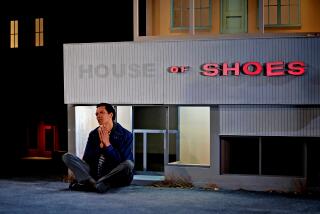Movie review: ‘The Arbor’
- Share via
It suggests a rural idyll, but “The Arbor,” the title of an inventive and haunting documentary, refers to a public housing project in England that might better be called a slum. “The Arbor” was also the title and setting of the first play by Andrea Dunbar, written as a school assignment when she was 15. When it premiered in London three years later, in 1980, Dunbar had never before been in a theater, or outside of Bradford, West Yorkshire.
Clio Barnard’s film is a devastating portrait of poverty and despair. Unfolding on multiple levels, it’s also, to a large extent, an examination of storytelling assumptions and the shaping of nonfiction narratives.
The filmmaker excerpts footage of Dunbar, an against-the-odds prodigy captured in a BBC documentary when she was a teenager. In those same Bradford locales, Barnard stages scenes from the play “The Arbor” — outdoors, in the housing project’s communal square, with random pieces of furniture as props and an audience of neighbors standing around the actors. It’s an apt choice for a theatrical piece fueled by a very local variety of chaos, dark humor and rich language.
Dunbar would write two more plays — her second, “Rita, Sue and Bob Too!” was turned into a movie, directed by Alan Clarke. But hers is not a story of the power of art to lift people out of dire circumstances. She died at 29, in a hometown pub, leaving three children by three (deadbeat) fathers. On the evidence of Barnard’s film, the young playwright’s legacy is at least as much about addiction, abuse and neglect as it is about creativity.
At the heart of the film is another group of actors. They speak directly to the screen — or appear to speak. Adapting the technique of verbatim theater — trailblazed by Anna Deavere Smith, among others — the director has her strong cast lip-sync to audio of her interviews with Dunbar’s children and friends. The effect is seamless, even as the framing of the performers pointedly avoids any semblance of “reenactment.”
It’s provocative and mesmerizing too, especially in the disparate emotional responses of Dunbar’s daughters. Beneath a benumbed surface, firstborn Lorraine (Manjinder Virk), who is half-Pakistani and had to contend with racism on top of poverty, roils with accusation; Lisa (an especially terrific Christine Bottomley) offers forgiveness with an enchanting brogue.
The film gradually becomes Lorraine’s story, and her lament can be tiring, until you realize that it’s a chillingly matter-of-fact confession of her own derelictions. For the Dunbar family, the blossoming in Bradford’s Arbor was brief.
More to Read
The biggest entertainment stories
Get our big stories about Hollywood, film, television, music, arts, culture and more right in your inbox as soon as they publish.
You may occasionally receive promotional content from the Los Angeles Times.










